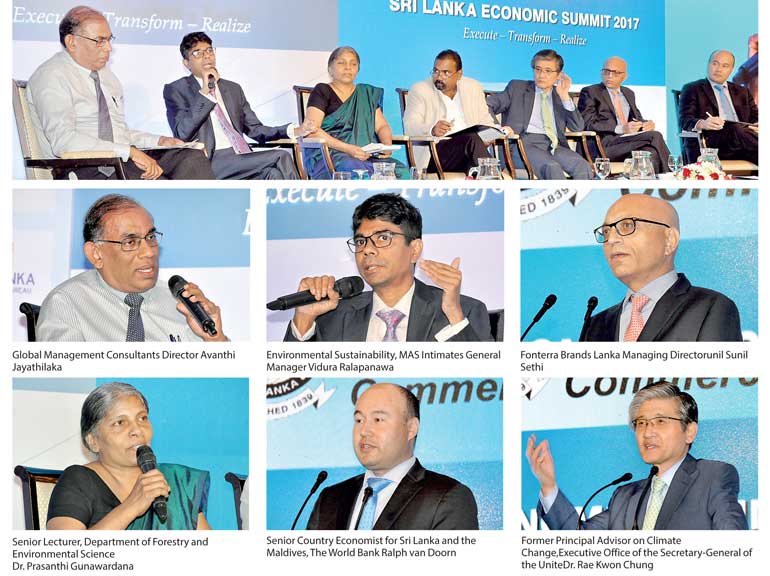Tuesday Feb 17, 2026
Tuesday Feb 17, 2026
Friday, 28 July 2017 00:00 - - {{hitsCtrl.values.hits}}
 By Himal Kotelawala
By Himal Kotelawala
Creating societal value along with corporate value through public and private sector collaboration in order to facilitate a greener, more sustainable economy was among the key points highlighted in a panel discussion on ‘Realising a greener growth path’ at the Sri Lanka Economic Summit 2017, organised by the Ceylon Chamber of Commerce yesterday.
Speaking at the event, former Principal Advisor on Climate Change, Executive Office of the Secretary-General of the United Nations Dr. Rae Kwon Chung said that the high carbon growth model is failing. Citing South Korea as an example, he said the model was riddled with crises in losing economic dynamism.
“It can no longer generate enough jobs. It’s losing momentum,” he said.
Instead, low carbon greener growth can result in more jobs, in addition to saving the planet, he pointed out.
“Some people say this is only for rich countries and not for developing countries. It’s about generating more jobs,” he said, warning against outdated advice doled out by what he called conventional economists.
“Don’t be fooled by conventional economists coming out with the argument that investing in low carbon costs money and time and it’s a burden on the economy,” he said.
Governments ought to think about long-term economics, considering current economic knowledge is incapable of predicting what lies ahead 20, 30 years in the future.
“Green growth is not a matter of money and technology. The technology is available; what isn’t available is policy,” he said, calling on policymakers to fundamentally reformulate the current economic system.
Enabling policy framework that is not limited to on-the-surface green action, but rather meaningful reform, he said, is not just a job for the private sector and the Government can do much to take charge.
As ecological goals are long-term and businesses have short-term profit goals, it is up to the Government to close that time gap, he said, adding that the private sector too must grasp green business opportunities.
“It might be better for businesses to look into business opportunity by cooperating with the Government,” he said.
Maintaining policy even when governments change is key, he said, drawing from the success of Costa Rica.
“The secret of Costa Rica’s success is that despite frequent changes of government they maintained the consistently same policy of reforestation and improving ecotourism. They maintained this policy for 30 years,” he said.
Sri Lanka, he said, could look at what he called healing tourism: a combination of the country’s natural heritage as well as its spiritual heritage. The country could combine nature with its Buddhist spiritual values and brand it, he said.
World Bank Senior Country Economist for Sri Lanka and the Maldives Ralph van Doorn, speaking at the event, said that Sri Lanka was not managing its natural assets very well.
“Sri Lanka is blessed with natural assets but these assets are not very well managed and they’re undervalued,” he said.
“Because of this under-valuation there are strains between things like urbanisation, infrastructure development, increased mobility and traffic, agricultural encroachment,” he added.
Natural disasters too leave a big impact, he said, costing in the long term about $ 380 million (about 0.5% of GDP). By 2050, this may go up to about 1.2% of GDP, he warned.
“Not managing your natural assets has a short-term impact. You don’t have to wait,” he said.
Green growth is necessary, efficient and affordable, said van Doorn.
“Green growth is growth that’s efficient in using resources; it’s clean in minimising pollution and environmental impact, it’s resilient in that it accounts for natural disasters and the role of natural management, the natural capital in preventing physical disasters. It’s inclusive,” he explained.
The political, behavioural and financing obstacles in the path of green growth need to be overcome, he said.
“Green growth will increase quality of life, ensure environmental sustainability and help you meet several of the SDG goals,” said van Doorn.
“In terms of incentives to the private sector to get where it wants to be; first of all, do no harm. Apply green filter to whatever policy. Look at harmful subsidies. Try to remove them and remove them by targeted cash transfers where needed: fertiliser subsidy being a case in point,” he said.
The private sector’s help should also be sought.
Fonterra Brands Lanka Managing Director Sunil Sethi said all parties need a shared purpose for shared success, adding that there is a conflict between business and society.
“While we have to create corporate value we also have to create value for the environment we live in. It’s all about having a shared purpose,” he said.
“Creating societal value along with corporate value is a must now. It’s no more a motivation, it’s a hygiene factor. The Government should rest assured that we’re not only doing it for business purposes; we won’t be able to hire employees if are not able to give back to society. We won’t be able to create an impact for anyone for generations to come; hence that’s a must-do for every corporate. The Government should encourage us and inspire us,” said Sethi.
There is still a gap from the policies that, he said, faced by the corporate sector, call for making an environment more conducive to do business.
“Help us create a sustainable business so we can continue to move forward on this journey of shared purpose,” he said.
“Nobody is doing anybody a favour. Whether it is you or me, whether it is the Government or the corporates, we all owe it to the generations to come. We have to give them a better place to live in. That is a shared purpose,” he added.
Pix by Lasantha Kumara